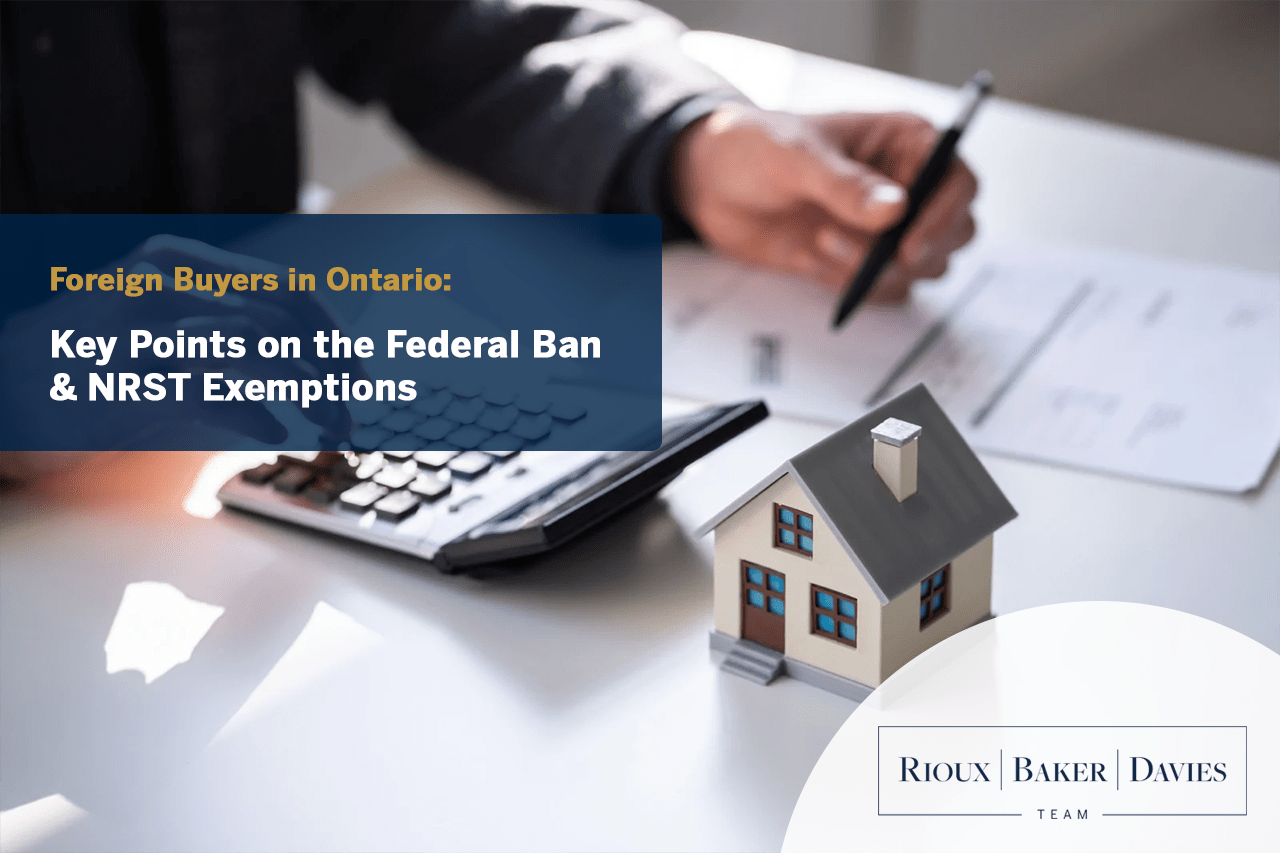Foreign Buyers in Ontario: Key Points on the Federal Ban & NRST Exemptions

Buying property in Ontario as a non-Canadian resident (often referred to as a foreign buyer) is possible, but it involves navigating specific federal restrictions and provincial taxes. Understanding these rules is crucial before you start your property search.
It goes without saying that seeking legal advice from a qualified lawyer is essential if you are considering purchasing property as a non-Canadian. Your REALTOR® is your guide in the market, but legal eligibility and tax implications require specialized expertise.
I recently attended an informative seminar on this complex topic led by lawyer James Rea of JW Rea Law in Toronto, who specializes in both Immigration and Real Estate Law. To help potential buyers get oriented, I wanted to share some key takeaways from his presentation (given on April 8, 2025).
Please remember: This information is for general understanding only and does not constitute legal advice. Every situation is unique.
Hurdle #1: The Federal Ban on Purchases by Non-Canadians
What is it?
The Canadian government enacted the Prohibition on the Purchase of Residential Property by Non-Canadians Act. This legislation is currently in effect and has been extended until January 1, 2027. Its goal is to help make housing more affordable by restricting purchases by non-Canadians in certain areas.
Who is a "Non-Canadian"?
Generally, this means individuals who are not Canadian citizens, not permanent residents of Canada, and not persons registered under the Indian Act. Certain foreign corporations are also included.
Where Does it Apply? Geographic Limits:
The ban only applies to residential properties located within specific zones defined by Statistics Canada:
-
Census Metropolitan Areas (CMAs): Large urban centres with a total population over 100,000 and a core population over 50,000 (e.g., Toronto, Barrie, Peterborough).
-
Census Agglomerations (CAs): Smaller urban centres with a core population between 10,000 and 50,000 (e.g., in the Southern Georgian Bay area, this includes places like Orillia, Midland, Collingwood, and Wasaga Beach).
Crucial Point for Many Regions
Large parts of Ontario, including significant areas in Cottage Country (Muskoka, Haliburton) and regions like The Town of the Blue Mountains, fall outside these designated CMAs and CAs. In these areas, the federal ban generally does not restrict purchases by non-Canadians.
Verify the Location:
If a property is near the boundary of a CMA or CA, verification is crucial. You can use this online tool from the Canada Mortgage and Housing Corporation (CMHC) to check a specific address: https://cmhc.maps.arcgis.com/apps/instant/lookup/index.html?appid=84481a24c11e46108b6c34602e707b0d
What is "Residential Property" under the Ban?
It typically means detached/semi-detached houses, townhouses, condo units, and similar properties (buildings with 3 or fewer dwelling units). It can also include vacant land zoned for residential or mixed use within a CMA/CA. Importantly, this can include cottages and cabins if they are located within a designated CMA or CA.
Exceptions (Even if Inside a CMA/CA):
If the property is within a ban zone, there are still specific exceptions:
Temporary Residents:
This is complex and requires meeting very specific conditions.
-
Students: Must meet criteria regarding 5 prior years of tax filings in Canada, 244 days/year physical presence in Canada for those 5 years, a purchase price under $500,000, and it must be their first residential property purchase here.
-
Work Permit Holders: Must have at least 183 days of validity remaining on their permit/authorization at purchase and must not have purchased residential property here before.
-
Legal advice is critical to confirm eligibility under these temporary resident rules.
Protected Persons / Refugees:
Those recognized under the Immigration and Refugee Protection Act are exempt.
Spouses/Common-Law Partners:
A non-Canadian buying jointly with a spouse/partner who is a Canadian citizen, Permanent Resident, registered under the Indian Act, a qualifying Temporary Resident (meeting the rules above), or a Protected Person, is exempt.
Other Situations:
Acquiring property through inheritance, divorce, separation, or as a gift is generally not considered a “purchase” under the ban.
Compliance is Vital:
Penalties for violating the Act can include fines up to $10,000 and potentially a court-ordered sale of the property.

Hurdle #2: Ontario's Non-Resident Speculation Tax (NRST)
What is it?
Separate from the federal ban, Ontario has its own 25% Non-Resident Speculation Tax (NRST).
Where Does it Apply?
This tax applies province-wide to the purchase price of residential property (containing one to six units) bought by non-Canadians. It applies regardless of whether the federal ban applies to the area.
Goal: Obtain an Exemption Upfront:
The best strategy is to see if the buyer qualifies for an exemption at the time of purchase to avoid paying the 25% tax. The main exemptions are:
-
Permanent Resident Exemption: If the buyer becomes a Permanent Resident of Canada before the closing date.
1.
-
OINP Nominee Exemption: If the buyer is nominated under the Ontario Immigrant Nominee Program at the time of purchase, has applied (or certifies they will apply) for PR, AND all buyers certify they will occupy the property as their principal residence within 60 days.
2.
-
Protected Person (Refugee) Exemption: If the buyer holds this status at purchase AND all buyers certify intent to occupy as a principal residence within 60 days.
3.
-
Spousal Exemption: If the non-Canadian buyer purchases jointly with a spouse who is a Canadian Citizen, PR, eligible OINP Nominee, or Protected Person, AND all buyers certify intent to occupy as a principal residence within 60 days.
4.
Strict Requirements:
Notice the principal residence requirement for exemptions 2, 3, and 4. This means genuinely intending to live in the property as your main home shortly after closing – it’s not just a paperwork designation. All co-purchasers generally need to meet exemption criteria or be Citizens/PRs.
-
Legal Advice is Crucial: Determining eligibility for these exemptions before signing a binding Agreement of Purchase and Sale is essential.
-
Rebates (Secondary Option): If NRST is paid, a rebate application might be possible later (e.g., if the buyer becomes a PR within four years and meets other conditions). However, securing an exemption upfront is far better financially.
In Summary
While buying property in Ontario as a non-Canadian involves extra layers of rules, there are pathways and opportunities, especially in regions outside the major federally designated urban zones.
The most important step is to get personalized legal advice early in your process.
Contact for personalized legal advice
James William Rea
JW Rea Law
-
127 Portland Street, Toronto
-
416-268-0655416-268-0655
-
james@jwrealaw.comjames@jwrealaw.com
-
www.jwrealaw.comwww.jwrealaw.com
-
LSO# 80737JLSO# 80737J

Disclaimer: This blog post provides general information. It is not legal advice. Laws and regulations can change. Consult with a qualified legal professional for advice tailored to your specific circumstances.
Blog Categories:
Quick Links
-
HomeHome
-
About UsAbout Us
-
Rental ServiceRental Service
-
Listing SearchListing Search
-
10 Advantages10 Advantages
-
ContactContact
Contact Us
-
243 Hurontario St,243 Hurontario St,
Collingwood, ON L9Y 2M1
Collingwood, ON L9Y 2M1 -
705 416 1499705 416 1499
-
riouxbakerteam@sothebysrealty.cariouxbakerteam@sothebysrealty.ca
© 2025 Rioux Baker Davies Team
-
The Blue MountainsThe Blue Mountains
-
Privacy PolicyPrivacy Policy


